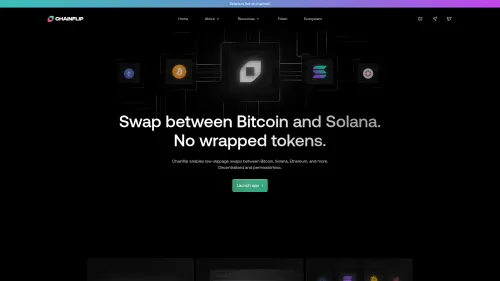Chainflip (FLIP)
Chainflip is a decentralized protocol designed to facilitate seamless cryptocurrency exchanges across multiple networks and blockchains. It prioritizes maintaining user custody of assets throughout the transaction process, eliminating the need for intermediaries or wrapped tokens. This protocol offers a novel approach to asset swapping, leveraging a unique Automated Market Maker (AMM) mechanism known as Just-in-Time (JIT) AMM.
Features of Chainflip
Chainflip distinguishes itself with several key features that enhance its functionality and user experience:
Decentralized and trustless protocol
Chainflip operates as a decentralized and trustless protocol, ensuring that users can exchange assets without relying on centralized entities. This decentralized nature enhances security and reduces the risk associated with traditional exchanges.

| Ticker | FLIP |
| Category | Decentralized Finance (DeFi) |
| Website | https://chainflip.io/ |
| @chainflip | |
| Telegram | chainflip_io_chat |
| Contract Addresses | |
|---|---|
| ethereum | 0x82...8a Copied! Copied! |
Cross-chain compatibility
One of Chainflip's standout features is its ability to facilitate exchanges across various blockchains without the need for wrapped tokens or traditional bridging methods. This capability allows users to swap assets between major blockchains efficiently and effectively.
Just-in-Time Automated Market Maker (JIT AMM)
The protocol employs a Just-in-Time Automated Market Maker (JIT AMM). This innovative mechanism enables Chainflip to offer competitive pricing and efficient asset swaps by dynamically adjusting liquidity in real-time, optimizing the exchange process for users.
Generalized integration
Chainflip's architecture is designed to be generalized and highly adaptable. It can integrate with any blockchain using any transaction type, providing flexibility and broad compatibility with different cryptocurrency ecosystems.
The role of FLIP token
Chainflip's ecosystem is powered by its native utility token, FLIP. The FLIP token plays a critical role in securing the network and facilitating the protocol's operations.
Staking and validation
A set of 150 validators are responsible for securing the Chainflip protocol. These validators are required to stake FLIP tokens, maintaining the network's integrity and stability. In return for their services, validators receive rewards in FLIP tokens, creating an incentive for maintaining the network's security.
Protocol fees and deflationary mechanism
Chainflip incorporates a unique economic model that indirectly benefits validators through protocol fees. Every asset swap conducted on the platform results in the automatic buying and burning of FLIP tokens via the liquidity pool system. This mechanism introduces deflationary pressure on the network, potentially increasing the value of FLIP tokens as trading volume rises.
